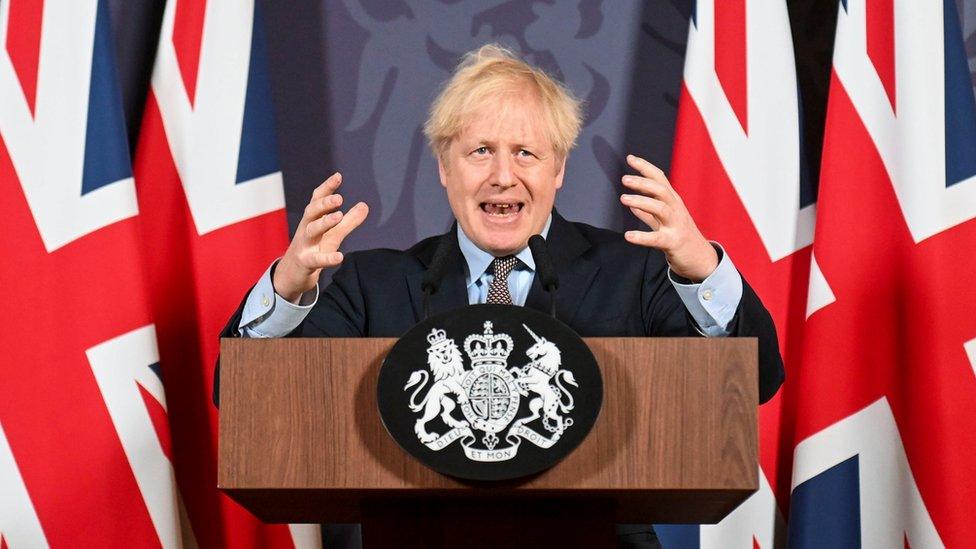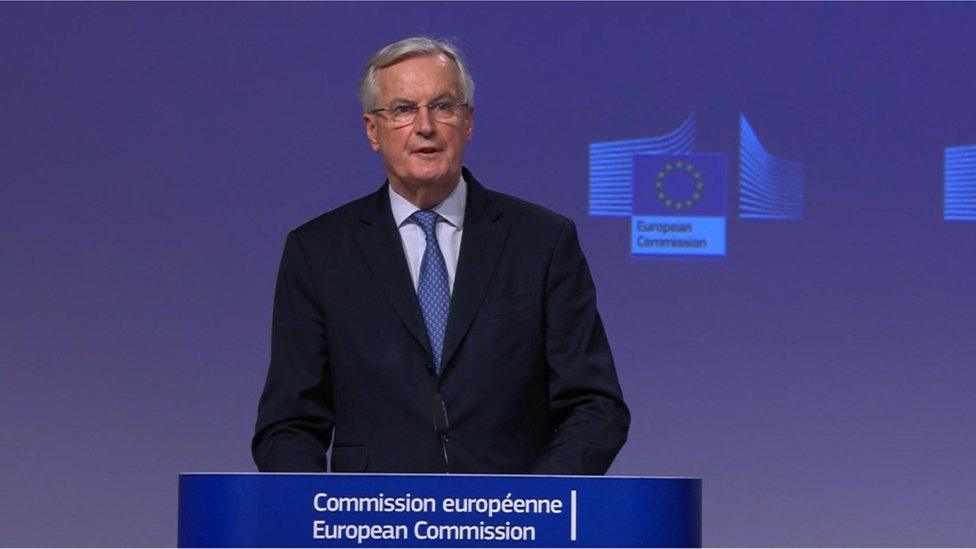Britain and Europe: A fresh new beginning?
- Published

Boris Johnson said the Brexit deal was good for the UK and for Europe
The detail is buried in many pages of dense text. So for now, in the early moments of relief at getting to a Brexit deal, it's the tone that counts for more than the line-by-line analysis.
Christmas Eve is the only night of the year when newspapers aren't published, leaving more space for political leaders and others to shape the narrative according to taste.
From Boris Johnson, this was about triumph, with big claims of delivering on Brexiteers' expectations. He was unprepared for an obvious question - the first one asked - about what had been conceded. And he blundered into a plainly false claim that there will be no tariff barriers.
After the experience of his capitulation last year on the trading relations with Northern Ireland - which he then flatly denied, and later set out to revoke, illegally - his mastery of the detail, or of uncomfortable realities, remains as suspect as ever.
However, this was was also about friendship, and a new, positive relationship, speaking of the European project as a noble endeavour.
From Brussels' point of view, Michel Barnier staked his claim for the defining soundbite to sum up the day's events: "The clock is no longer ticking".
There, too, there's a reset, and a new start. No triumphalism, but regret - at the UK leaving, and regret at the elements of the deal that the British government was not willing to sign up to. That includes the Erasmus student exchange scheme - a symbol of Europe's notion of freedom, in contrast with Boris Johnson's, and one that probably plays better with young British people than it does with the Brexiteers.
The message was also like the one at the end of a game show: "Let's see what you might have won", or: "Look at what the British have lost by leaving".
The materials published immediately after the announcements included 25 advantages of being inside the European Union, about citizens' rights and travel, security, economic protections and co-operation.
It showed in graphic terms that Britain retains only two of them - tariff free trade and visa-free travel, but only for 90 days at a time.
As we knew all along, the outcome of this had to suit the Brexiteers, who have got a pretty hard version of Brexit, though not as hard as some might like. And it had to work for the Europeans, in making sure they stayed united, the benefits of being inside the club were clear, and the costs of leaving are also laid out clearly.

"The clock is no longer ticking," said Michel Barnier
From Emmanuel Macron in Paris, there was a different tone from the one at podiums in Brussels and London. He is heading into French presidential election season. "The unity and strength of Europe paid off," he said. "The agreement with the United Kingdom is essential to protect our citizens, our fishermen, our producers. We will make sure that this is the case".
That final sentence carries a warning. The deal starts with no tariffs or quotas on goods. But it doesn't guarantee things stay that way.
We only know fragments of the agreement for now, but it seems that both sides have opportunities to take infringements of the level playing field to arbitration, and to ask for the right to take retaliatory action.
Boris Johnson illustrated this with the example of farm animal welfare. If Britain makes it more expensive to farm pigs, it can stop inbound pork from undercutting British farmers.
But it's somewhat more likely that a deregulatory Conservative government is going to find the pressures and tensions are in the other direction, as the European Union raises its regulation of business, and meets a British refusal to align.
That's where we get back into the possibility of tariffs or quotas.
More negotiations
And as ever, a deal on fish has not made that prospect go away. The two sides travelled a long way to get to a rise from around half of the UK waters' catch going to EU registered vessels, to a position in five years where the UK gets two-thirds.
While the EU gave up more on the timescale it wanted, the UK gave up more on percentages of catch.
It's long way from the expectations of Brexiteers, though some point out that any trade deal was bound to have a transition period, and the UK fleet doesn't yet have the capacity to take up new-found quota. Some £100m has been found to help it prepare for that.
But after five years, "theoretically, anything is possible," said the prime minister. As a sovereign, independent coastal state, it seems the UK can force EU countries to negotiate access to UK waters.
But theoretically, it's also possible that the EU can bring back the prospect of tariffs or quotas to reduce access to its markets. They are vital to British fishing effort already.
And if UK vessels are to pick up all the quota of herring, whiting, sandeels, spratts, saithe, anglers and roughead grenadier that it can only sell in the European Union, it faces a consequent weakening of its negotiating position.
In other words, the end of negotiations on Brexit look like the start of lots more negotiations, on lots more issues. As Switzerland finds, from outside the EU while ringed by it, the talks never end.
